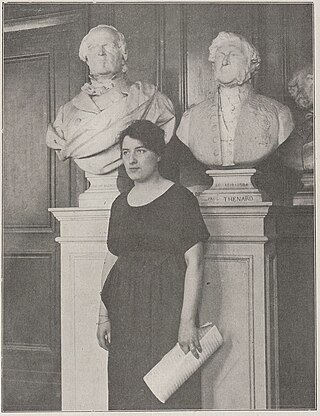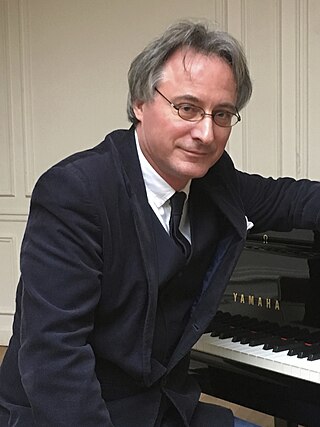Kimi Sato | |
|---|---|
| Born | 5 March 1949 |
| Other names | 佐藤 喜美 |
| Occupation | Composer |
Kimi Sato (born 5 March 1949) is a Japanese composer.
Kimi Sato | |
|---|---|
| Born | 5 March 1949 |
| Other names | 佐藤 喜美 |
| Occupation | Composer |
Kimi Sato (born 5 March 1949) is a Japanese composer.
She was born in Sendai where she studied with Yoshiro Irino and graduated from the Toko Gakuen School of Music in Tokyo. She continued her studies at the Paris Conservatory with Olivier Messiaen, graduating in 1978. She returned to Japan in 1981 and was awarded the Prix de Rome in 1984, becoming the first foreign recipient of the prize. [1] [2]
Selected works include:

Olivier Eugène Prosper Charles Messiaen was a French composer, organist, and ornithologist. One of the major composers of the 20th century, he was also an outstanding teacher of composition and musical analysis.

The Conservatoire de Paris, also known as the Paris Conservatory, is a college of music and dance founded in 1795. Officially known as the Conservatoire National Supérieur de Musique et de Danse de Paris (CNSMDP), it is situated in the avenue Jean Jaurès in the 19th arrondissement of Paris, France. The Conservatoire offers instruction in music and dance, drawing on the traditions of the 'French School'.

Louise-Justine Messiaen, more commonly known under her pseudonym Claire Delbos, was a French violinist and composer, and first wife of the composer Olivier Messiaen.
Louis Henry Nicolas Thiry was a French concert organist, composer and pedagogue. He was professor of organ at the Regional Conservatoire in Rouen and played in concerts internationally. His many recordings include the complete organ works of Olivier Messiaen in 1972, which received several awards and led the composer to describe him as "an extraordinary organist". Thiry was blind.

Elsa Jacqueline Barraine was a composer of French music in the time after the neoclassicist movement of Les Six, Ravel, and Stravinsky. Despite being considered “one of the outstanding French composers of the mid-20th century,” Barraine's music is seldom performed today. She won the Prix de Rome in 1929 for La vierge guerrière, a sacred trilogy named for Joan of Arc, and was the fourth woman ever to receive that prestigious award.

Atala Thérèse Annette Wartel, née Adrien, was a French pianist, music educator, composer and critic.
Solange Ancona was a French composer.
Claire Renard is a French composer and multimedia artist.

Michèle Reverdy is a French composer.
Melanie Ruth Daiken was an English composer and music educator. She was born in London, the daughter of a Canadian mother and Leslie Daiken, a Russian-Jewish writer from Ireland. She began violin lessons at an early age, and studied piano and composition at the Royal Academy of Music, the University of Ghana, and the Paris Conservatoire with Yvonne Loriod and Olivier Messiaen. After completing her studies, she took a teaching position with the Royal Academy of Music and became Deputy Head of Composition in 1986.
Louise Augusta Marie Julia Haenel de Cronenthall was a German composer who lived and worked in France.

Jeanne Leleu was a French pianist and composer. She was born in Saint-Mihiel in northeastern France; her father was a bandmaster and her mother a piano teacher. She entered the Conservatoire de Paris at the age of nine, where she studied with Marguerite Long, Georges Caussade, Alfred Cortot and Charles-Marie Widor. With Geneviève Durony, Leleu gave the premiere performance of Ravel's Ma mère l'oye in 1910. Ravel had composed his Prelude for a Paris Conservatoire sight-reading competition in 1913 and Leleu won the prize.

Marie-Marguerite-Denise Canal, also known as Marguerite Canal, was a French conductor, music educator and composer. She was born in Toulouse into a musical family, and her father introduced her to music and poetry. She studied singing and piano at the Paris Conservatoire in 1911, and after completing her work there, became a teacher at the Conservatoire.
Edith Canat de Chizy is a French composer, born in Lyon and now based in Paris. She was the first female composer to be elected a member of the Académie des Beaux-Arts.
Monic Gabrielle Cecconi-Botella is a French pianist, music educator and composer.
Adrienne Clostre was a French composer. She was born in Thomery, Seine-et-Marne, and studied at the Conservatoire de Paris with Yves Nat, Darius Milhaud, Jean Rivier and Olivier Messiaen.
Gisèle Barreau is a French composer.
Françoise Barrière was a French editor, writer and composer.
Odette Gartenlaub was a French pianist, music teacher and composer.

François Weigel is a French pianist, conductor and composer.